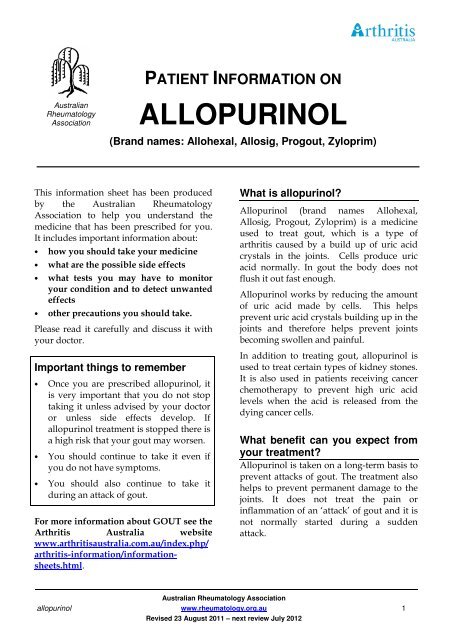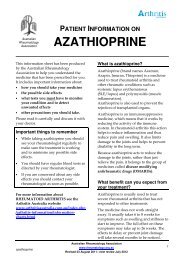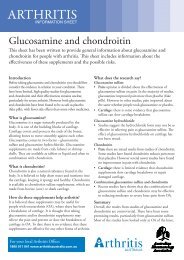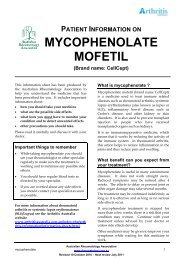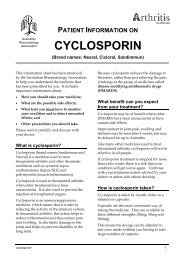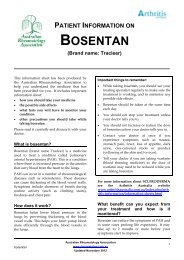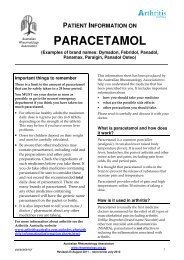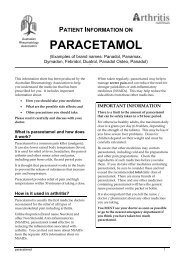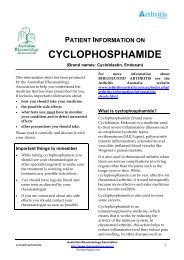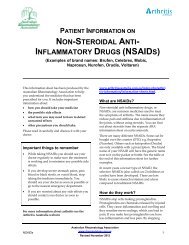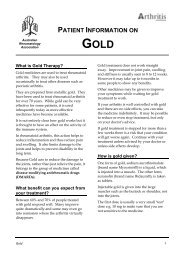ALLOPURINOL - Australian Rheumatology Association
ALLOPURINOL - Australian Rheumatology Association
ALLOPURINOL - Australian Rheumatology Association
Create successful ePaper yourself
Turn your PDF publications into a flip-book with our unique Google optimized e-Paper software.
PATIENT INFORMATION ON<strong>Australian</strong><strong>Rheumatology</strong><strong>Association</strong><strong>ALLOPURINOL</strong>(Brand names: Allohexal, Allosig, Progout, Zyloprim)This information sheet has been producedby the <strong>Australian</strong> <strong>Rheumatology</strong><strong>Association</strong> to help you understand themedicine that has been prescribed for you.It includes important information about:• how you should take your medicine• what are the possible side effects• what tests you may have to monitoryour condition and to detect unwantedeffects• other precautions you should take.Please read it carefully and discuss it withyour doctor.Important things to remember• Once you are prescribed allopurinol, itis very important that you do not stoptaking it unless advised by your doctoror unless side effects develop. Ifallopurinol treatment is stopped there isa high risk that your gout may worsen.• You should continue to take it even ifyou do not have symptoms.• You should also continue to take itduring an attack of gout.For more information about GOUT see theArthritis Australia websitewww.arthritisaustralia.com.au/index.php/arthritis-information/informationsheets.html.What is allopurinol?Allopurinol (brand names Allohexal,Allosig, Progout, Zyloprim) is a medicineused to treat gout, which is a type ofarthritis caused by a build up of uric acidcrystals in the joints. Cells produce uricacid normally. In gout the body does notflush it out fast enough.Allopurinol works by reducing the amountof uric acid made by cells. This helpsprevent uric acid crystals building up in thejoints and therefore helps prevent jointsbecoming swollen and painful.In addition to treating gout, allopurinol isused to treat certain types of kidney stones.It is also used in patients receiving cancerchemotherapy to prevent high uric acidlevels when the acid is released from thedying cancer cells.What benefit can you expect fromyour treatment?Allopurinol is taken on a long-term basis toprevent attacks of gout. The treatment alsohelps to prevent permanent damage to thejoints. It does not treat the pain orinflammation of an ‘attack’ of gout and it isnot normally started during a suddenattack.<strong>Australian</strong> <strong>Rheumatology</strong> <strong>Association</strong>allopurinol www.rheumatology.org.au1Revised 23 August 2011 – next review July 2012
Most common possible side effects• The most common side effects are nauseaor vomiting. These can be reduced if youeat little and often. If you are sick, drinkplenty of liquid.Less common or rare possible side effectsThere are some rare but potentially seriousside effects with allopurinol.• Skin problems: Allopurinol can cause arash or flaking skin. Very rarely, severeskin rash and mouth ulceration canoccur. If any of these occur contact yourdoctor straight away.• Tiredness: Drowsiness can occur. If itmakes you feel sleepy, avoid driving oroperating machinery.• Liver: Allopurinol can inflame the liver.Blood tests can pick this up if it occurs.The dose of allopurinol may need to bereduced or it may need to be stopped, ifproblems occur. Contact your doctorimmediately if you notice yellowing ofthe skin and/or whites of the eyes.• Other: Headache, dizziness, tastedisturbances, high blood pressure,feeling generally unwell, and hair losscan occur.Long term side effectsAllopurinol can be taken for long periods tomanage gout. There seem to be no longterm side effects.Allopurinol does not affect a person’sability to have children in the long term.See also Precautions.What precautions are necessary?Blood tests• You may need to have blood testsduring the first few months of treatmentdepending on what other medicines youare taking and depending on your otherhealth concerns. The uric acid level inyour blood will be checked to make surethe medicine is working.• It is important to see your generalpractitioner (GP) regularly as they havean important role in monitoring yourcondition.Use with other medicines• Allopurinol can interact with othermedicines. You should tell your doctor(including your general practitioner,rheumatologist and others) about allmedicines you are taking or plan to take.This includes over the counter orherbal/naturopathic medicines. Youshould also mention your treatmentwhen you see other health professionals.• Allopurinol increases the blood levelsof the immune suppressingmedications azathioprine (Imuran) andmercaptopurine (Puri Nethol). Takingallopurinol with either of thesemedications can be very dangerous.You must tell your doctor if you aretaking or are advised to take either ofthese medications. If either of thesemedications is taken with allopurinoltheir dose needs to be very carefullyreviewed.• Other medicines that may interfere withallopurinol include: warfarin, ampicillin,amoxicillin, thiazide diuretics andsulfinpyrazone.• Aspirin can be used safely in the lowdoses taken for prevention of heartattack and stroke. You should avoidtaking aspirin in all other circumstanceas at higher doses it can raise the uricacid level.• Allopurinol can be taken safely withanti-inflammatory drugs (NSAIDs), aslong as your kidney function is normal.• The simple pain reliever, paracetamol,and combined medicines such asPanadeine and Panadeine Forte, can beused while taking allopurinol providedyou take them as directed.<strong>Australian</strong> <strong>Rheumatology</strong> <strong>Association</strong>allopurinol www.rheumatology.org.au3Revised 23 August 2011 – next review July 2012
Use with alcohol• Alcohol can trigger an attack of gout.When taking allopurinol, keep youralcohol intake to a minimum i.e. 1 to 2standard drinks, once or twice a week.Drinking more than 4 standard drinkson one occasion, even if infrequently, isstrongly discouraged. In some casestotal abstinence from alcohol isrecommended. Check with your doctorabout your situation.• In addition to alcohol, other things thatmay trigger an acute gout attack includedehydration, diuretics (fluid tablets) andstopping allopurinol treatment.Use in pregnancy and when breastfeeding• The effects of allopurinol duringpregnancy have not been well studied,so it is not clear if it causes birth defects.• If you are pregnant or are consideringhaving a child, you should discuss thiswith your doctor before beginning thismedication.• Allopurinol may be taken when breastfeeding.How to store allopurinol• Store allopurinol in a cool, dry place,away from direct heat and light.• Keep all medicines out of reach ofchildren.Questions?If you have any questions or concerns writethem down and discuss them with yourdoctor.Your doctor’s contact detailsIf you are taking allopurinol you shouldsee your doctor regularly to make sure thetreatment is working and to minimise anypossible side effects.The information in this sheet has been obtained from various sources and has been reviewed by the <strong>Australian</strong> <strong>Rheumatology</strong> <strong>Association</strong>. It isintended as an educational aid and does not cover all possible uses, actions, precautions, side effects, or interactions of the medicinesmentioned. This information is not intended as medical advice for individual problems nor for making an individual assessment of the risks andbenefits of taking a particular medicine. It can be reproduced in its entirety but cannot be altered without permission from the ARA.The NHMRC publication: How to present the evidence for consumers: preparation of consumer publications (2000) was used as a guide indeveloping this publication.<strong>Australian</strong> <strong>Rheumatology</strong> <strong>Association</strong>allopurinol www.rheumatology.org.au4Revised 23 August 2011 – next review July 2012


